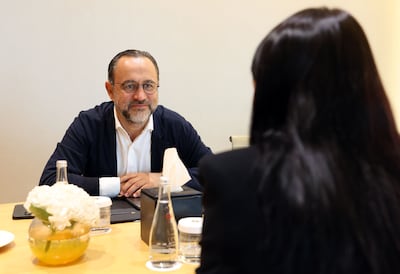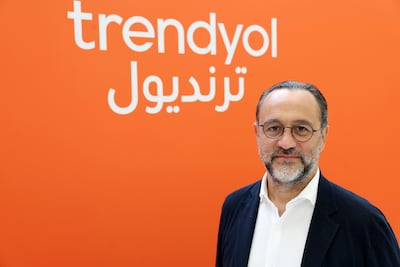Alibaba-backed Trendyol Group, one of Turkey's leading e-commerce platforms, has developed its first in-house large language model, boosting its technological capabilities as part of the company's efforts to expand.
“This pioneering technology is set to transform how Trendyol supports its sellers and enhances customer experiences across 25 countries, focusing on the GCC region,” said Caglayan Cetin, president of Trendyol Group, in an exclusive interview with The National.
Trendyol's large language model (LLM) allows real-time communication between cross-border sellers and consumers, and is part of its broader strategy to maintain a competitive edge in the fast-growing e-commerce sector.
The model utilises the company's vast database, and marks a substantial investment in artificial intelligence and research and development. This move also aligns with Turkey's push for technological innovation, Mr Cetin said.
The LLM, fully developed and owned by Trendyol, benefits from their strategic investor, Alibaba’s cutting-edge machine-learning technologies and resources, such as its microchips, he said.
“We have access to the machines, machine-learning technologies, and chips of Alibaba, where we can continuously develop our large language model,” he added.

Alibaba owns a 70 per cent stake in Trendyol, and the rest is owned by other strategic investors such as SoftBank Group, General Atlantic, Qatar Investment Authority, and Abu Dhabi's sovereign fund, ADQ.
Mr Cetin emphasised that the LLM will allow Trendyol to effectively support its sellers, particularly to navigate the complexities of cross-border sales.
With more than 100,000 sellers from Turkey exporting their products across the region, the advanced AI capabilities are expected to streamline operations and improve the overall user experience.
“This sophisticated technology will enable our sellers to communicate more efficiently and effectively, enhancing their ability to serve customers in various markets, especially in the Gulf,” he added.

Gulf expansion plans
The company is expanding its operations in the Gulf region as part of its growth strategy. It has moved from one warehouse in the UAE to another facility in Saudi Arabia and hired more than 500 employees for both warehouses.
“Saudi Arabia is our largest market, and establishing more warehouses will allow us to meet the increasing demand and improve our logistics capabilities,” Mr Cetin said.
The Middle East and North Africa's e-commerce market grew 11.8 per cent last year to around Dh106.5 billion ($29 billion) and is projected to reach Dh183.6 billion by 2028, according to a report from EZDubai.
Trendyol's strategy also includes minimising carbon emissions as it strives to become carbon-neutral within the next decade.
“We are not just expanding our physical footprint; we are also committed to sustainable practices, like using 100 per cent sustainable packaging as [soon] as possible and working with manufacturers who share our sustainability ethics,” he said.
Market success
The company had set a goal to reach $1 billion in gross merchandise value (GMV) in the Gulf by the end of the year. Instead, Mr Cetin said, his company has already surpassed this figure in the region, with close to 3 million active shoppers and more than 8 million app downloads in the Gulf. The company aims to hit 10 million downloads by the end of the year, reflecting the robust demand for its services.
Trendyol's growth trajectory is evident in its revenue figures, especially during critical sales events. March was a landmark month during Ramadan when the platform generated nearly three times its usual revenue.

Mr Cetin said the company processed more than a million orders during this period in the Gulf alone and aims to surpass that figure in upcoming months.
“Our daily orders have reached 200,000 in the Gulf region, and we're seeing similar successes in Turkey, where we have more than 2 million daily orders,” he noted. While Trendyol's recent growth is noteworthy, he indicated that the company has further plans for expansion.
Going public
Trendyol's rapid growth isn't limited to the Gulf, he said. With international revenue now making up nearly 20 per cent of its overall business, the company is on track to further expand its global footprint. As Trendyol works towards its goal of 50 per cent international sales, it is eyeing an IPO before 2030.
Trendyol's last valuation in 2021 was $16.5 billion, following significant investments from backers such as SoftBank, ADQ, General Atlantic and the Qatar Investment Authority.
“Our strategy is to continue investing in key markets and driving innovation through AI and logistics. Once we reach 50 per cent of sales internationally, we will look towards going public,” Mr Cetin concluded.


